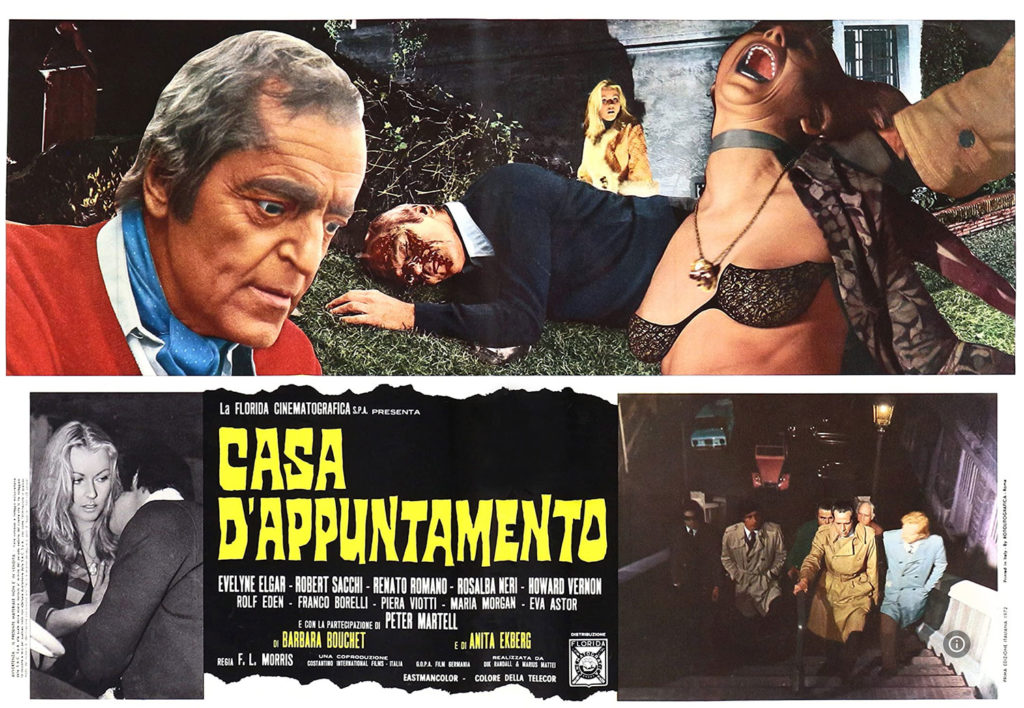The French Sex Murders, the giallo from director Ferdinando Merighi, opens with a foot chase up the steps of the Eiffel Tower. Plainclothes police are chasing a fleeing suspect, who then leaps to his death, his identity hidden from the viewer. A detective, Inspector Fontaine (Robert Sacchi), peers over the railing, and reminisces about how this case, now closed, began on the first night of Carnival.
Antoine Gottvalles (Peter Martell) is an unsavory sort. He’s shifty and nervous, and has sticky fingers, stealing jewels and gold from a church. He celebrates his ill-gotten gains by visiting a house of ill-repute, run by Madame Colette (Anita Ekberg). Gottvalles made the mistake of falling in love with one of the girls, Francine (Barbara Bouchet), who, in turn, made the mistake of returning, and then spurning, said love. Enraged, Gottvalles slaps Francine around, and the next audiences see of him, he is leaving the house in a hurry. Soon after, a writer, Randall (Renato Romano), discovers Francine’s body, bludgeoned to death with a table lamp.
Gottvalles is captured, tried, and sentenced to death by guillotine. At sentencing, he pleads his innocence. He declares a curse on all those involved in aiding his conviction, and also on all his friends and acquaintances who didn’t believe his innocence. He swears that he will return from beyond the grave and exact his revenge on them all. His targets are the aforementioned Madame Colette and Randall; his ex-wife and lounge singer Marianne (Rosabla Neri), to whom he fled for safety following the murder, only to be rebuffed; Marianne’s lover and nightclub owner, Pepi (Rolf Eden); and Judge Teschi (William Alexander), who passed sentence. For some reason, Inspector Fontaine doesn’t make his hit list.
Before he can be executed, Gottvalles escapes, and a chase through Paris follows. It’s a short one, though, as Gottvalles, riding a stolen motorcycle, is decapitated when he runs into the back of a parked truck, in effect carrying out the sentence he was given. This is an interesting sequence in the film, as it seems tailored as an optional scene — as if it was constructed so overseas distributors could cut it to reduce the film’s running time and it would have no effect on plot or pacing whatsoever.
Soon after, the targets of Gottvalles’s curse begin turning up dead, and it’s up to Inspector Fontaine to unravel the mystery.
Some of the would-be victims are worried that Gottvalles is carrying out his curse from the grave, but this is no supernatural flick. The principals in the cast, most importantly Inspector Fontaine and Professor Waldemar (Howard Vernon), who is studying  Gottvalles’s brain post-mortem, now believe that Gottvalles was innocent of the murder of Francine, and that the true killer is still out there, tying up loose ends.
Gottvalles’s brain post-mortem, now believe that Gottvalles was innocent of the murder of Francine, and that the true killer is still out there, tying up loose ends.
Like many giallo, the plot is as complicated as an American soap opera, and is packed to the gills with subplots and peripheral characters that somehow merit extensive screen time. There’s a love story between Waldemar’s daughter, Eleonora (Evelyne Kraft), and his assistant, Roger (Franco Borelli), and another subplot involving Pepi and one of his club’s dancers. All this is distraction for the viewer, and for Fontaine, who has to navigate this complicated mess.
Despite the wanderings of the plot, there is enough focus on the core elements that a viewer should still be engaged for denouement. There are innumerable clues for a viewer to ponder. How Fontaine comes to his final conclusion is a bit silly and clichéd, but the final reveal itself is satisfying and unexpected. All that’s left is to see the identity of the person who leapt from the Eiffel Tower at the start.
This isn’t the best giallo one can see. Merighi’s direction was tight, though. He managed to juggle a typically overwrought Italian narrative and keep focus on the important stuff, even if there are sequences that could be lopped off like a gangrenous limb.
Of the performers, Sacchi was the most interesting. This was his first film. He bore a stunning resemblance to Humphrey Bogart, and much of his career after this film was spent imitating the Hollywood legend. He very much channels Bogart as Marlowe or Sam Spade. His voice was dubbed in the English-language version, and the voice bears an uncanny resemblance to Robert De Niro’s. This isn’t the first time I’ve heard this unnamed voice actor dubbing a giallo, and it makes me wonder if Bob was picking up some extra cash in a recording booth in the 1970s.
Howard Vernon was another performer of note. His character’s disaffected, yet curious, manner and workaholic nature conceal a rewarding amount of depth if one pays close attention.
Anita Ekberg, who received top billing, was, unfortunately, just a famous name by this point. Her days of playing the lead were over by 1972, when this film was released.
The larger ensemble was very much up to the task — another indication that Merighi knew what he was doing. Scenes are full of exposition, meaningful or not, but Merighi didn’t always focus on the characters doing the expositing. He would have the camera linger on a character on the periphery, showing us that a character was, perhaps, hearing something relevant to their own mysteries and motivations. It’s a tricky thing, to ask that a character act natural and suspicious at the same time, but it works.
There are giallo galore for a viewer to choose from in this era of streaming. The French Sex Murders is a fine one to take in, even if it wasn’t made by one of the giants of the genre.
